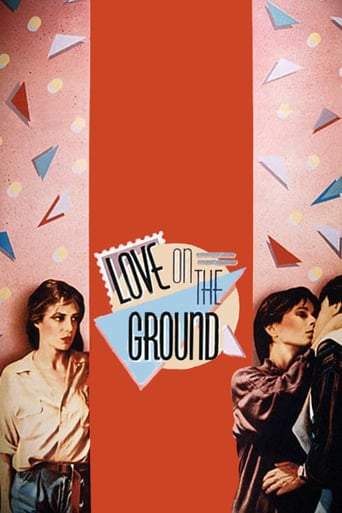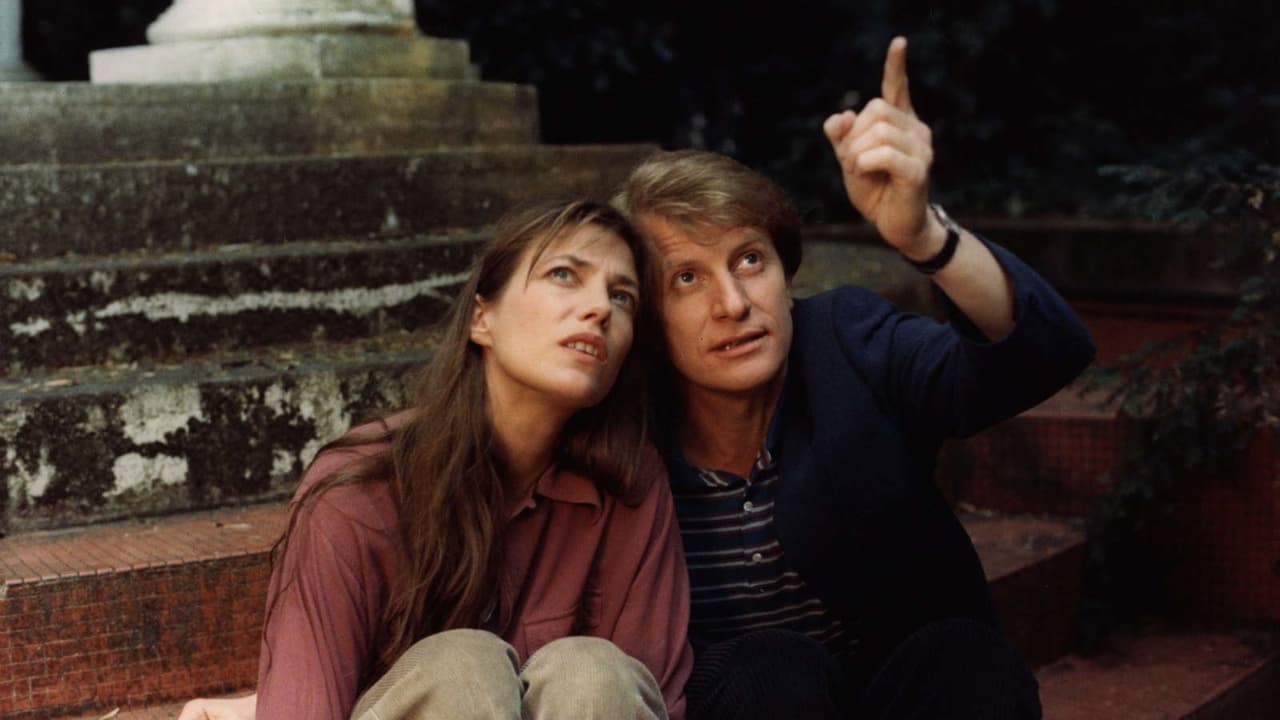gridoon2018
If you ever feel tired of the noise, the speed, the clutter of modern cinema, take a nice long (in this case, 169 minutes long - in the Director's Cut) break from all of it with a Jacques Rivette film; it's an experience like no other. As far from "art for art's sake" as it is from the mainstream, "Love On The Ground" is simultaneously very simple and very complicated: it's about the artistic process, the way life influences art (and vice versa), the quest for love, random human encounters (in the metro, in a bar), and magical visions of the future! It's not for every taste or mood, but if you are in the right mood (I was), you'll probably find it refreshingly unhurried and thoroughly absorbing. *** out of 4.
chaos-rampant
Most films narrow us down, make as if reality is some solid, fixed, particular thing. I don't perceive it in any such dogmatic way in real life and what I'm after in the cinema is filmmakers who can show it to be fluid and empty of a particular reality, currents of colored air. Baudelaire spoke of the flaneur who walks the city in order to experience himself in the center of the multitude of possible views. Further back it was Taoists who talked about being able to wander far and wide, freely entering each thing without being fettered by its particularity.With Rivette, as with Resnais before and Lynch after, it comes down to fictions within fictions, selves within selves or as other selves who hover in and out of experiencing themselves at the center of fictions. Possible views where no single one alone is real but they all make each other possible.Everything with these makers often doubletimes as self-referential; obvious here, about actresses coming to a villa to rehearse a play at the behest of the author, coming and going from enactments of trysts and dalliances as part of the play to actual affairs taking shape outside the fiction in the same house.But - as with Hiroshima mon amour and Mulholland Drive - it's the broader view that entices me with something like this, that it can chart that liberating path where reality is neither fixed nor on the other hand random, a surreal flight of fancy, but something is giving rise to its dreams and in turn inhabiting those dreams as itself. Rivette had done it before in Celine and Julie, he bestows us the gift of free wandering again here.It's marvelous to be able to walk freely to find ourselves at the center of what he has prepared.The main reality here is someone wondering about love, perhaps after a betrayal. It may be that only Geraldine or the woman- inside-the- play's character is real (but that doesn't mean anyone is imaginary in the sense of Tyler Durden where we know he is).It begins with the two women discovering each other as mistresses of the same man, but instead of something that irrevocably happened in any one reality, we get it as the last scene of a play that unfolds inside an apartment, with the audience snooping after the actors in full view of the fiction taking shape.Two actresses; one brash and free- spirited, the other reserved and romantic, both - like Celine and Julie - different facets of a self that dreams herself as either, both complicit in the effort to make sense out of some mystery concealed in the fictional play that requires their participation to come alive.They fall for two men; both illusionists (playwright - stage magician) used to being in deceiving control of appearances, both were in love with the same woman who disappeared one night and the play, we find out, is about events of that night in the same house, disguised memory that needs a woman to come alive.So as it comes alive in this house, all sorts of spontaneously arising views blossoms, not all of them as planned within confines of that story. Selves are swapped, Jane ends up playing the character of Paul the magician while being courted by him outside the play. Omens abound, premonitions of mystery; a hallucinated scene of murder, a mysterious dark room with boarded windows where one of the men sits alone in a chair. Eventually, having persisted in the fictional remembered world where a woman (an inner woman wondering about love) is courted by those two, both are shown to be deceiving. It comes around with the last scene of this play with an audience in full view; but now the woman- within makes an appearance, summoned by the fiction to be chased off, the girls saving her for her own good. The premonition of death conspires to happen but, unlike the dream, no one really dies.We get to freely inhabit without knowing; dreams, affairs, overlapping layers of illusion that can only come to life because actors comply to participate, and all this as a woman wandering through her own place in unfathomable emotions that were set in motion long ago. Eventually the fiction is shown to be empty. The women go out laughing. The statue of Cupid that she broke to pieces one night is magically put together and standing in its place. To my mind, this is a milestone on the path from Lady of Shanghai to Mulholland Drive and that makes it indispensable wisdom.Something to meditate upon
oOgiandujaOo_and_Eddy_Merckx
I feel lost and out to sea watching this stuff but maybe that's how you're meant to feel? It's like you are watching the rites of a cult. Do you even want to understand? Not me, not really. I have this strong feeling that Rivette is a mystic.The outline of the plot is that you have three friends Emily, Charlotte, and a guy who I think was called Silvano, they do a play, in an apartment, the idea is that the audience turn up and watch in silence, whilst being directed around the apartment by a guide. Obviously this is not something you can do for a large audience. Anyway I quite like the idea, although the jostling would be unbearable. The play they are doing is basically a theft of an early play from a guy called Roquemaure, who just happens to be in the audience.It's also improvised as Silvano is being naughty and is getting himself drunk in reality rather than just drinking ginger ale from the whisky bottle prop. So Roquemaure is appreciating this anyway and decides he's going to get these three Thespians to act in a new play of his, which he is going to get them to do in the same style, i.e. the audience will follow the players around his mansion. So this is like mutual theft, Silvano has stolen Rocquemaure's play, Rocquemaure steals Silvano's style. It's not the first act of theft we're going to see here, Rocquemaure gets one of the actresses as a supposed audition to do an ad lib, the results of which he then impregnates the play with. Rivette really rubs this in towards the end Rocquemaure keeps on writing down things that people say to him for incorporation in future plays. So one of the points of the film perhaps is that art and life are really the same thing, and that artists steal from each other. There are also allusions to Rocquemaure's script being modified by his butler/famulus Virgil behind the scenes. That is that artists are collagists, collaborators, plagiarists, in short not so auteurist as they would have us believe.Anyway it becomes clear that the play Rocquemaure is putting on is really an almost unadulterated transcript of a real life ménage à trois involving himself, the magician Paul, and a woman called Beatrice, set in the very places it happened. Paul is there the whole film observing the rehearsals and sticking his oar in. Rocquemaure as a high jest perhaps, has a woman, Emily, play Paul's part and gives him the name Troppman. Obviously there are romantic liaisons going on throughout this.This is a film that may well reward study, there's too much to take in, too many implications. What I did catch though were the numerous implications and insights about the creative process. One further one is that it becomes clear that one of the main motivating factors for Emily and Charlotte is the cash and they probably would have stopped working on the play without it, as they had lost belief. There are probably religious connotations, Rocquemaure is like some sort of Wagnerian God controlling all of these puppets.The film is also very playful, at first we think that some of Paul's magic or some of the magic inherent in the magnificently particoloured villa may be malfeasant. However, like in a Robbe-Grillet movie, it's is all heavily disclaimed at some point, all we are watching is a fantasy.I love this movie.
Delly
I think the reason that Rivette is the least popular -- yet by far the most secret, profound and precious -- of the New Wave directors is that he can't be pinned down to a belief. He isn't political, though corporate conspiracies are a factor in many of his films; he isn't an occultist, though his films are filled with Zodiacal symbols, the tarot, magicians; he isn't interested in putting humans under the microscope like Rohmer, though he is minutely attentive to what breaks people apart and brings them together. No; rather, politics, the occult, and humanity are like the vines tying together the raft through which he floats in the void. They are methods to generate material, curiosity and, as lit students would say, a narrative where none necessarily exists. I hope I'm making this clear -- Rivette actually LONGS FOR a worldwide political conspiracy, preferably controlled by a dark magus operating from some deceptively plain apartment in Paris, with the whole human comedy under his spell, because he knows that the alternative, what most people call "reality," would be soul death. He wants more mystery, more confusion, more action. Unlike Godard, he isn't looking for utopias, certainly not those that can be brought about by politics; he wants the world to be as it is, in all its unfathomable, malevolent, messy beauty.As Jean-Pierre Kalfon says in L'Amour Par Terre one of Rivette's most insidious and fascinating films, by the way -- "I don't want to make life better than it is; I want life." Rivette, like many filmmakers who have disavowed their faith, has really only sublimated his religious quest. His obsession with the creative process, its false starts, abrupt detours and unknown destinations, is unmistakably of a spiritual nature. As it turns out, he is obsessed with stories because the world as we know it exists in order to contain them. For Rivette, God is not an obscure savior ( what are we being saved from? ) but a generator of fictional material, the ultimate creative artist. If the other world is defined by its permanence, its frozen perfection, this one must contain everything that can possibly exist, and the human artist, such as Rivette, then becomes like a sort of middleman between heaven and earth -- he gives form to the transitory, thus translating it for eternity.Rivette's "strangeness" can be boiled down to his attempt to mirror God's mind by disavowing any ultimate truth. God requires stories in order not to be bored; stories require a world ruled by space and time where they can play out in a bounded setting, with a beginning and end; the world requires life in order to act out these stories. Stories, in short, require that we die. The two words that best describe Rivette's movies, "dark" and "childlike," come from the fact that, to accept that we are in a virtual, fictional realm, you must become as naive as a child for whom death is not real, yet who is subconsciously haunted by what it might mean. We die, but only because we're in a play. We die as children, but the curtain eventually rises ( he finally gives us a peek at what's behind it in his presumably final film, Marie et Julien. ) All this and more is part of why Rivette is so successful at blending the occult and the everyday there is nothing more occult than the fact that we're here at all, pretending we know what we're doing.


 AD
AD



